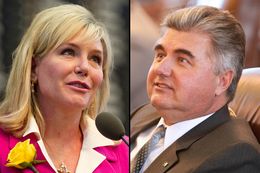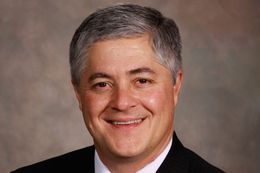
Roughly nine months away from the party primaries, two Harris County Republicans this week announced bids to replace outgoing state Reps. Patricia Harless and Allen Fletcher.
But don’t expect those two to be the only ones to run.
Kevin Roberts, a longtime Republican activist and the COO of the Lanier Law Firm, said his campaign for Harless’ seat will focus on a “common sense, practical approach to problem-solving while upholding our strong, conservative fiscal and social principles.”
“I will fight in Austin to eliminate the franchise tax, curb the growth of property taxes, advocate for an exceptional education system in Texas, and protect a pro-business, pro-family, and pro-life atmosphere for all Texans,” Roberts said in a statement.
Tom Oliverson, meanwhile, is running for Fletcher’s seat in House District 130. Oliverson, an anesthesiologist, helped pass a bill relating to anesthesia regulations during the 2013 legislative session and was part of Lt. Gov. Dan Patrick’s Inaugural Committee.
“I will fight to promote free markets and end burdensome regulations that cripple our businesses and hurt the Texas economy,” Oliverson said in a statement. “I will unapologetically defend the life of the unborn, fight for lower property taxes, protect our border, be an advocate for education reform, and defend our 2nd Amendment rights.”
The two candidates who launched their campaigns Tuesday are working with consultant Allen Blakemore. Harless, R-Spring, said Monday that in-party fighting contributed to her decision to leave the Legislature, while Fletcher, R-Cypress, is running for a constable spot in Harris County.
Gail Stanart, the wife of Harris County Clerk Stan Stanart, confirmed she’s also considering a bid for Harless’ seat. She has served as president of the Texas Tea Party Republican Women and said she would be the “solid long-term conservative activist Republican” if she runs.
“The decision has not yet been made, but yes, it is certainly being considered,” she said. "It is something that we’ve been looking at for a while.”
The districts — both reliably conservative — will likely be decided in the Republican primaries, which observers say could end up crowded.
“It’s very, very early,” said political consultant Jennifer Naedler. “I can’t imagine that these won’t be extremely crowded races.”
Or as Gary Polland, the former chairman of the Harris County GOP, put it: “How often do you get an open seat?”
Turnout at the March primaries will be significantly higher than usual given the 2016 presidential primaries, which could diminish the impact of the more conservative voters who reliably show up each election, said Mark P. Jones, a Rice University political scientist.
Yet if enough candidates run in the House primaries, it could spread the vote out among a wider range of candidates, potentially forcing the race to a runoff election.
“If it goes to a runoff, we’re going to have a low-visibility runoff, and that’s where Tea Party groups can play an outsized role and have a much greater than normal level of influence,” Jones said.






